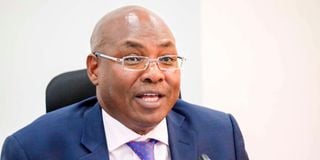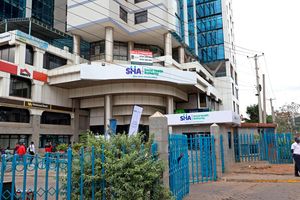PS Kimtai: Here is all you need to know about new health plan

Mr Harry Kimtai, the Principal Secretary in the State Department for Medical Services.
What you need to know:
- We are fully prepared to publish the list of hospitals that have received reimbursements, but it is the same hospitals that are against this transparency. Those who claims have not been paid and they are overdue and there are no challenges should come forward and publicly clarify their position.
- The logistics of how NHIF previously worked with facilities were complicated, which is why we’ve restructured how outpatient services are compensated.
The migration from the National Health Insurance Fund (NHIF) to the Social Health Authority (SHA) that will now have three funds—Social Health Insurance Fund (SHIF), Primary Health Care Fund, and Emergency, Chronic and Critical Illness Fund—has been marred by delays and system downtimes. Medical Services Principal Secretary Harry Kimtai delves into all these, discussing the system, complaints by hospitals on delayed payments, what happens to your money once deducted, why the rush to start the system, and many more. He spoke to the Nation’sANGELA OKETCH.
Many Kenyans think the Sh104 billion to upgrade the old NHIF system is a scam. Would you say Kenyans are truly getting their value for money on this?
Instead of just focusing on the cost, it’s crucial to understand how we arrived at that figure, the factors that contributed to it, and the long-term impact of the system. The work that is being done should be evaluated in its entirety, and many may not yet see the bigger picture.
In terms of the scope, the system provides value for money, and in fact, it is more cost-effective in the long run.
What was the urgency in moving to a system that had not been set up, and which then required officials to outsource to another firm, Savannah Informatics?
We selected Safaricom to lead the Consortium due to their extensive network and proven track record in technology, particularly in building the digital superhighway. However, Safaricom cannot handle everything on its own, which is why they brought in partner companies as consortium members. Each member has specific roles and responsibilities. If one member is unable to meet their mandate, they subcontract the work to another capable company, like Savannah Informatics, which was chosen based on their expertise.
The subcontracting process was agreed upon within the consortium, and Savannah Informatics was contracted to carry out the work. This doesn’t reflect a loss, it’s an opportunity for a Kenyan company, and they will be compensated for their services.
Apeiro Limited, as a consortium member, has provided much of the funding for the digital superhighway, and we are not relying on National Treasury for funding. Since we are not directly funding the project, Safaricom handled the subcontracting process, which allowed for Savannah Informatics to step in and continue the work. What matters most is that the work is ongoing, and we remain focused on achieving the agreed deliverables outlined in the consortium agreement within the stipulated time.
The consortium is at liberty to subcontract any firm that they feel have the skills that they need. Other Kenyan companies have also been engaged to create registries and medical terminologies, this is allowed.
The government has committed to funding the services over the next ten years, with payments made once the revenue from the system begins to flow in. There has been no upfront payment.
It is estimated that the planned system was only going to be ready in two years once the contract was signed. Again, what was the rush about?
We knew it would take time to fully develop it and we also had a target date of October 1st to roll out Universal Health Coverage. We met and agreed that the minimum viable product could be delivered sooner to allow registration of Kenyans, a portal for facilities to provide services, and e-claims for SHA to process claims and that’s we are currently working on as we roll in bits. The system will be ready as earlier planed, two years.
Let’s talk about the registration and what that means. First, what provisions are in place to ensure vulnerable groups like orphans are not left behind?
Under NHIF, the government previously sponsored vulnerable members of society, covering their healthcare costs. This support is still in place, but with a slight change in procedure. Now, individuals must first register and undergo means testing to capture their data. If their income level falls below Sh300 (with some even as low as Sh100), the government will cover their premiums.
We have provided guidance to counties on how to identify vulnerable individuals, conduct means testing, and register them so that they can be covered throughout the year. For those not covered by counties, the national government, through social protection programmes, will allocate funds to cover them.
We are actively building a database for these individuals and once their data is captured, they will automatically be recognized in the system. This ensures that when they visit hospitals, the system confirms their registration and they receive the services they need.
In cases where a vulnerable person is not yet registered but requires services, hospitals are encouraged to notify the SHA management. This will allow us to place them under the vulnerable group and ensure they receive the necessary care.
For salaried individuals who are not registered but are still being deducted, where is their money going?
The responsibility for these deductions lies with the employer. We will conduct audits to determine the exact amounts deducted from employees. In cases where an employer fails to remit these deductions to the SHA, the law provides provisions to hold them accountable for non- remittance.
What happens to Kenyans who are not registered and do not remit their monthly payments to the SHA if they fall sick?
The law is very clear—if you are Kenyan and you require medical services, you must be registered and contribute to SHA. Those who are not registered will have to pay out of pocket to access treatment. Registration and monthly contributions are mandatory to ensure everyone is covered.
As a nation, we have collectively agreed to pool our resources, whether we are currently sick or not. This shared responsibility ensures that the healthy contribute to support the sick, fostering a system of solidarity and mutual care.
For unemployed individuals, we have made provisions for self-declaration, allowing them to pay based on a generated amount within the system, ensuring inclusivity for all Kenyans.
Since the rollout, how much has SHA collected and how much have SHA claims from hospitals amounted to since the rollout?
In October, the first month of the rollout, SHA collected Sh6.4 billion. In the second month, we saw a decrease to Sh5.3 billion, a drop of Sh1.1 billion. We are still investigating the reasons behind this drop—perhaps some employers haven’t been remitting the deductions to SHA, or maybe Kenyans paid in the first month and defaulted in the second.
Initially, we had suggested upfront payment for the entire year for the unemployed but we allowed a four-month payment window while we develop insurance premium financing options, including arrangements with cooperatives to manage payments.
In October, the first month, SHA processed claims totalling Sh2.1 billion, all of which were paid. In November, claims amounted to Sh1.1 billion, and we are still assessing and reviewing the total claims. However, we are up to date with SHA claims payments.
How many facilities have registered under SHA?
Over 5,800 facilities are currently empanelled with SHA, and we are aiming to have about 12,000 hospitals registered. We are actively investigating why some licensed facilities haven’t registered yet. If necessary, we will publish a list so that Kenyans know which facilities are part of the system.
We are also cleaning up the data because some hospitals are not meeting the required standards for licensing. It’s concerning that some licensed facilities are reluctant to join the system, and we are working to understand why.
Hospitals have demanded you make public the facilities you have paid, as they insist their bills are still pending. Why isn’t that list freely available?
We are fully prepared to publish the list of hospitals that have received reimbursements, but it is the same hospitals that are against this transparency. Those who claims have not been paid and they are overdue and there are no challenges should come forward and publicly clarify their position. We are up to date with SHA payments, and we urge them to allow us to publish the names of both registered and non-registered hospitals to highlight any discrepancies.
The law mandates that claims be paid within 90 days, but we’ve been making payments within 45 to 60 days, which is ahead of schedule.
We urge hospitals to stop making threatening statements and focus on attending to patients. If there are issues, we should address them constructively. Complaints from hospitals are increasingly becoming a tactic to derail the system. Let's be vocal when the system is not working, but also acknowledge when it is functioning well.
Regarding NHIF accrued bills, as of October 4th, the amount due for payment from the initial Sh30 billion set aside by the transition committee was Sh19 billion. After reviewing the figures, we have paid Sh9 billion, leaving a balance of Sh10 billion, which will be cleared as we continue reconciling the data.
We are committed to paying all outstanding amounts, as we took on all NHIF liabilities. Once we confirm that the funds are due, we will ensure they are paid. Going forward, any savings generated under SHA after clearing current claims will be used to settle outstanding debts.
How can hospitals provide quality outpatient services for just Sh900 per person per year?
The logistics of how NHIF previously worked with facilities were complicated, which is why we’ve restructured how outpatient services are compensated. To ensure fairness, we need to assess the population of the area where the facility is located and how many facilities fall within the provider’s jurisdiction. From there, we multiply the total population by the Sh900 capitation, which is the amount hospitals are entitled to per year, paid quarterly.
This system highlights the importance of registration. If we don’t increase the number of registered Kenyans, there won’t be enough revenue to sustain facilities and ensure they are paid fairly for the services provided. That’s why we are urging Kenyans to register.
Additionally, we have established a review committee to assess and streamline the outpatient services currently offered in hospitals, ensuring efficiency and quality care for all.
Why was the Edu Afya programme scrapped and how do schoolchildren now benefit from SHA?
On December 12, President William Ruto announced that starting next year, parents must ensure their children are registered under dependents and they pay their premiums if they are unemployed. Children will be covered under the Taifa Care programme as dependents of their parents.
If parents fail to register and pay, they will be responsible for medical expenses if their children fall sick. While we previously tried covering secondary school students directly under NHIF, the programme proved d expensive and was subject to fraud. That’s why we’ve shifted to having parents cover their children’s healthcare, making it their responsibility to ensure they’re registered and contributing.
What about the Linda Mama programme? Are there modalities in place to ensure mothers continue benefiting from SHA without being turned away?
For expectant mothers who are not yet registered, health facilities must ensure they are registered under SHA when they visit the facilities for their monthly checkups. Their details will then be captured under Linda Mama in the portal, allowing the government to extract the data and pay for their care.
The advantage of this system is that the government covers the premium for the entire household for a full year under the mother’s registration. This means that dependents can be added and covered for the year. After that, they will return to the normal portal.
What about in cases of teenage girls needing maternity care but do not have identification cards?
This surprised us well, we did not capture the young girls when we were coming up with the system, however, because of the huge numbers in need of services, we have engaged the Ministry of State Department for Migration and Citizen Services, who suggested using birth certificates for registration, but not all girls have one.
To address this, we have developed a policy and created a section in the portal where facilities will be able to key in the details of the teenage mothers directly. They will be given services under a unique identifier, and once they obtain an ID, they will be transferred to the main portal.
The Emergency and Chronic Fund, which was designed to support patients with chronic illnesses once their SHA coverage is exhausted, and is currently inactive on the portal. What’s going on there?
The creation of the Emergency and Chronic Fund was tied to the Finance Bill, with the intention of it being exchequer-funded. However, its full implementation was put on hold due to funding constraints. We had hoped the Finance Bill would provide the necessary resources, but since this stopped, the fund remains on hold while we continue to seek alternative funding solutions.
This is why we are asking every Kenyans to register and pay their premiums so that when we have the money, we can allocate some to the ECF but if few are paying, we will be forced to wait until we have the funding.
Now, when a patient's SHA premium is exhausted, they will pay in cash. Unfortunately, the fund is not yet fully operational.
When do we expect a stable system without the hitches?
We have told Safaricom team to accelerate and within the next six months and we put the system in bits, we will be at 100 per cent stability.
If the system fails, as the person in charge, do you acknowledge that Kenyans will hold you accountable?
As the responsible accounting policy head of the state partner for medical services, I assure Kenyans that this initiative will be delivered without fail. Let’s each play our part—register and pay your premiums—and trust us to handle the rest.





